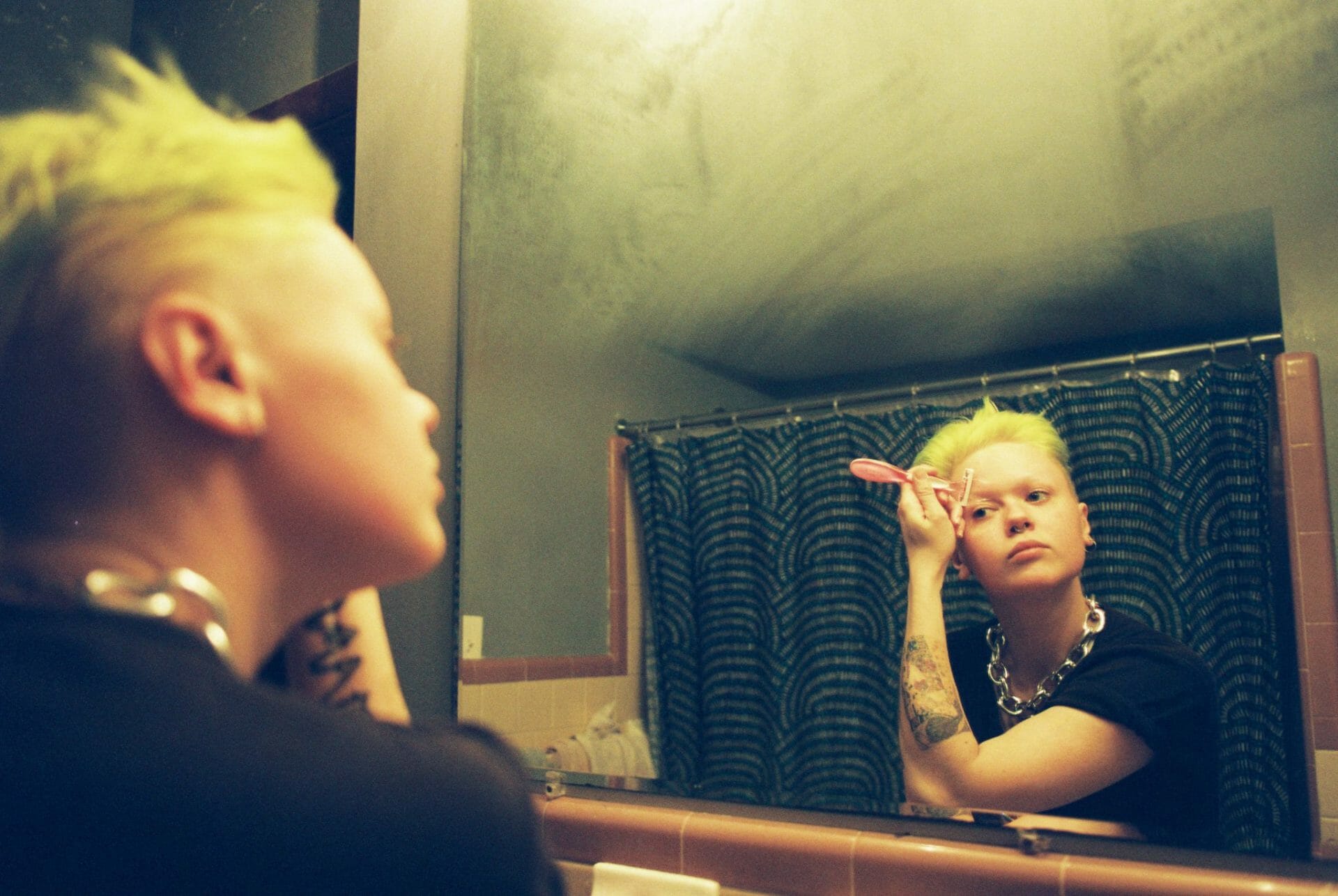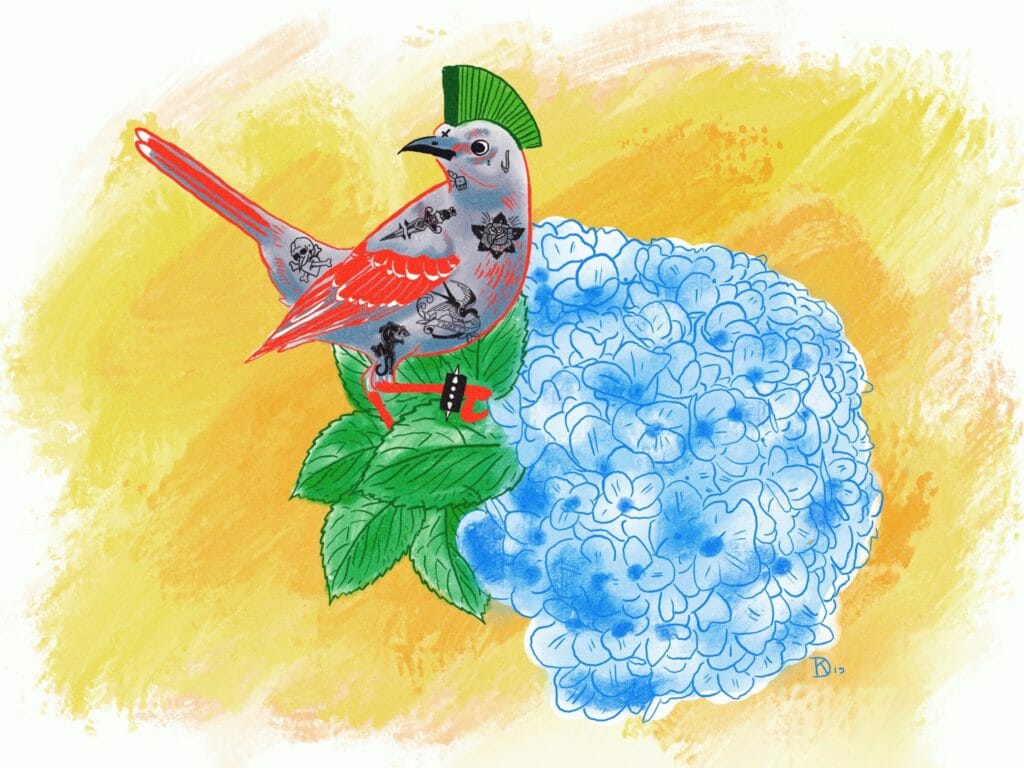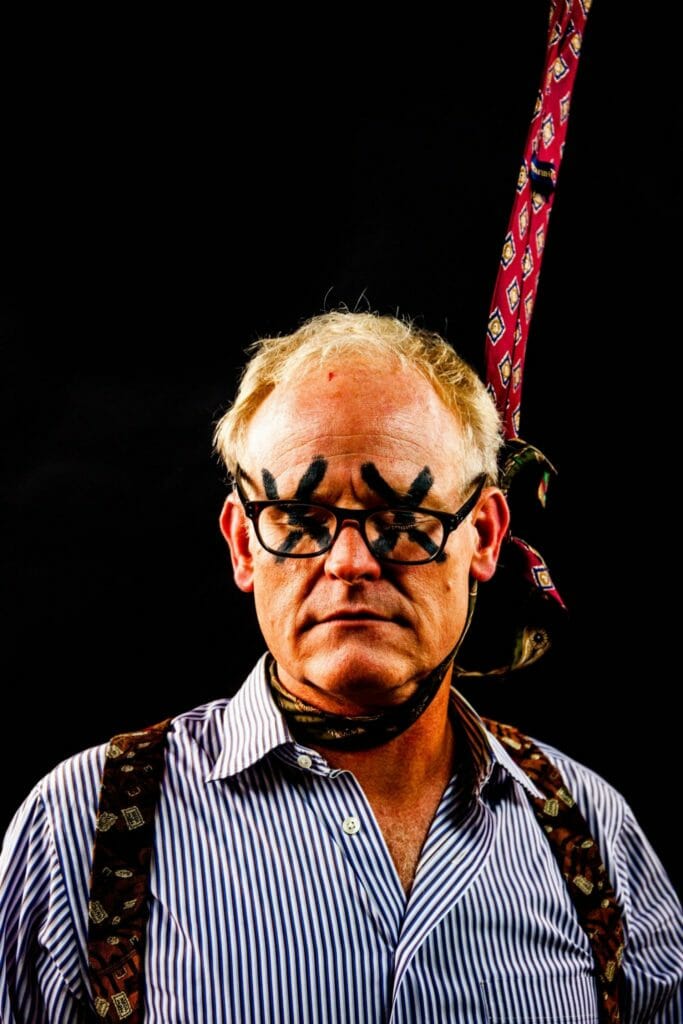What would you say if I told you that the King of Edgewood — the sequin-bearing makeup virtuoso and all-around badass, flaming, gender-fluid drag king known as TJ Maxxx — was raised in a small town in southwest Georgia and homeschooled by Christian missionaries? The lighter-hearted might simply cock their heads to the side and say something cute like, “Well, that’s interesting.” The more cynical among us, however, might say, “Sounds about fucking right.”
My reaction was somewhere in between. However, having spent the past four years involved in youth development work, as I sat across from the blue-haired, blue-eyebrowed, clearly confident, articulate, and humble TJ, I found myself thinking, “I feel like someone did something very right.”
Indeed, TJ Maxxx hails from Thomasville, Ga., where his parents were enthusiastic Christians. He was homeschooled, and didn’t leave the house much. But if you’re thinking his childhood looked like a scene from Children of the Corn, you’re actually far from the truth. In fact, the more TJ and I talked about his upbringing, the more it sounded like something that would make a Montessori school teacher shed tears of joy. I say this because TJ’s parents were big on giving him space to explore himself creatively and doing so as autonomously as he pleased. So, after he’d finish his academic work in a matter of hours, he was then on his own to paint, draw, lip-sync with his boombox in the bathroom, or anything else a young creative might do to fill their time in the absence of structured schooling. Although he admits having some angst at times about wanting to be parented more, he overall reflects pretty fondly on the experience.
I was very isolated, but in a positive sense. I did have a lot of freedom to do what I wanted with my time.
“I was very isolated, but in a positive sense,” he recalled. “I did have a lot of freedom to do what I wanted with my time. A lot of times that looked like me staying in my PJs and painting for eight hours. It was great. I [once] watched an entire season of ‘Lost’ in a day. I was sitting downstairs in my fluffy robe with my watercolors, and the show was on and my siblings would hang out. It was great.”

At what point do we start filing ourselves down to socially palatable personas? At what point do we stop playing dress up and drawing, and what triggers that process?
As TJ and I chatted about his youth, I couldn’t stop drawing lines between his confidence, onstage and off, and his childhood dominated by artistic exploration for exploration’s sake. Amid the modern epidemic of imposter syndrome, how does someone gain the confidence at 22 to not only go around dancing on stage, taking on an undercurrent of drag that is still commonly misunderstood — but then also start experimenting with their own gender fluidity and requesting that their pronouns and name be changed in their workplace? Being someone who typically strives to not be seen, I found TJ’s comfort with dramatic visibility (remember the blue eyebrows?) and his cool, casual, shoulder-shrug openness to whatever the experience brings to be a bit halting. I wondered at what points in our lives that my friends and I, as well as the youth I’ve worked with, stopped being these eccentric little versions of ourselves. At what point do we start filing ourselves down to “socially palatable” personas? At what point do we stop playing dress up and drawing, and what triggers that process?
I once had a friend who was an elementary school art teacher. She told me that kids typically stop drawing for fun around ages eight to nine, because that’s when they start comparing themselves to others, sifting through who does and doesn’t count as an artist based on what art we’ve told them is valuable. And I would venture to say that this experience doesn’t just apply to art. Comparing ourselves to our peers and the accompanying market-driven raiding of the human experience are the culprits that, over the arcs of our lives, suck away so much of the joy we experienced in childhood. However, this is why I found myself so enamored with TJ’s freedom in pursuing creative ventures simply for the purpose of following his interests. Because his isolated childhood removed comparison and utility from the equation, he was able to fixate only on the fun and exploration of art.
He experienced and he expressed. And in that regard, not much has really changed for the drag king, who works his day job as a receptionist for a Buckhead hair salon and then by night performs his drag — after doing three hours of makeup, that is.
However, that’s not to say that his drag identity stays hidden in the scene. TJ goes by TJ, his drag name, as well as masculine pronouns in his daytime life. “The more I did it, the more I was like, drag isn’t enough,” he explains. “And having it purely be performative isn’t enough for me. I need to actualize and integrate that into my daily life. And the way people refer to me, it can\’t be just a nightlife of dressing up and having fun. It\’s more real to me than that.”
He went on to describe the support he received from his boss at the salon.
“It has been cool, because I am really close with my manager at my job I’ve been at for four years,” he explained. “They’ve known me by my full name and the name I go by outside of drag, which is basically a nickname of my full name. I don’t know that I necessarily consider it a dead name, but no one really calls me by that anymore … And having the conversation with her of, like, ‘These are the pronouns my friends use for me, and I know I am in a professional setting and I’m not trying to be a snowflake and ask for special treatment, but just so you know, this is what I am most comfortable with. And I know you care as my friend as well, so if you have you to refer to me a certain way because we are in a professional environment, I respect that. But also, this is how I truly feel.’ And it’s been fun to watch her baseline pronouns for everyone shift to become more gender neutral, because I’ve been trying to do the same. Anyone I don’t know, and also people I do know unless I am making a point to respect their pronouns, I just use they/them across the board.”
I confided in TJ how much it bristles me that people who live under the gender-queer umbrella have to constantly assess whether they’re crossing into “snowflake” territory, especially when talking to more conservative family members or peers. The last thing you want to do is step too firmly across that metaphorical line and detonate the virtue signaling associated with the word “snowflake.” At that point, you cease being the actual person in front of them who is simply trying to articulate the things that make you feel whole, and you become that other being that Fox News has warned them about: the overly-sensitive, gender-bending aliens who are responsible for every liberal social blight in major American cities, from brunch to cancel culture to hairless vegan cats. TJ was all too familiar with the feeling of being tossed into the snowflake camp.
“It’s such an invalidating term, and I wanna be taken seriously and respected,” said TJ. “The second I morph into that snowflake territory, I feel like it undercuts anything I am trying to make a point about. I’m very careful about that with my parents, ‘cause my dad is very Republican and traditional and it\’s very hard for us to relate. But my mom is very hippie-dippy and tells me, ‘I just love that you’re pursuing your passion,’ even though she’s very Christian. But my dad is over here, like… I’ll tell him about friends I have, and he immediately goes, ‘You’re using these pronouns, but what were they assigned, what are they really?’ … I’m like, ‘I can’t respectfully answer that question in the way that you’re wanting me to. I get the information you’re trying to glean from this, but your focus is on the wrong thing here.’”
…we are so gendered and so much of our lives revolves around that binary and what we were assigned at birth, that taking the steps to question that and think for yourself and be self-aware, you have to break down your entire intrinsic foundation of who you are as a person and go, \’Well, who am I really, beyond that structure that I\’ve been given?\’
I asked TJ why he thought the mention of anything genderqueer makes some people, especially Republican dads, itch so much.
“My theory is because we are so gendered and so much of our lives revolves around that binary and what we were assigned at birth, that taking the steps to question that and think for yourself and be self-aware and think, ‘Well, what do I want?’ you have to break down your entire intrinsic foundation of who you are as a person, and go, ‘Well, who am I really, beyond that structure that I’ve been given?’ A lot of people don’t experience the level of discomfort to push them to that point of wanting to question or needing to make a change … So I feel like, for a lot of people, when they see someone who has transcended those questions and is expressing themselves freely, it’s threatening to their sense of personal security. A lot of people aren’t comfortable stepping outside that box of, ‘Do I identify with traits or aesthetics beyond what is socially normal?’ It’s uncomfortable for people.”
This was something that had been on my mind a lot: the triggers that make someone delve into the world of gender fluidity (or even simply being accepting of it in others) versus the social cement that keeps so many devotionally bound to traditional gender narratives, so much so that they struggle to leave space for others to explore. If all social interactions are performative — and I believe most are — then there are a lot of people out there just following someone else’s script, re-enacting behaviors they’ve seen demonstrated by heteronormative society, and policing anything that falls outside of that. TJ and his drag and genderqueer comrades, on the other hand, are living by their own choice of social performance, which doesn’t seem self-indulgent or needy, as those who toss around the term “snowflake” might judge. It just seems natural. Why keep playing someone else’s character?
That’s essentially what we do when we enforce boundaries on ourselves or others, basing these limitations on any socially replicated narrative that has been cemented by ritual and repetition into a norm. But if you take those narratives apart and play with them — if you, say, put assless overalls on a drag rendition of Luigi — now that’s taking power back from the gender binary narrative. Then these silly stories we tell ourselves about what we can do, thanks to some immutable characteristic, become just that: silly. And if you don’t play with it, then you’re a slave to it. You get itchy anytime someone breaks the barrier.
If one were to try and interrogate TJ’s gender (and I would be up my own ass if I said I didn\’t immediately do so, and then felt rather invasive for it), it’s really hard to put him in a box, and maybe that’s the point. Yes, he identifies with he/him pronouns, which might trigger our brains into their cascade of categorizing behaviors to then assume that he wishes to present as a cis-man when dragging, but that’s not really the case. If you were to cruise through TJ’s Instagram (@tjthedragthing), you would be bombarded with shimmering, full-face makeup and outfits teeming with neon colors. If you’re lucky enough to see him perform, you’ll find that he dances with the flamboyant energy of a newly-out theater kid performing the soundtrack from Legally Blonde: the Musical. His gender expression reminds me of a pinball machine: bright colors, flashing lights, sounds, spastic movement. He floods you with sensory input. And it’s far from a display of traditional masculinity.
My first time seeing TJ perform was on a rainy Thursday night at Mary’s. When my friends and I got there, the room was populated by a modest sized crowd and filled with the energy of anticipation. There was very little mingling. Most patrons were doing what I was doing, which was hovering near the group of friends they came with, shooting glances around the room to see when the performers would begin. I glanced upstairs as well and could see old lamps, mirrors, and garments tossed across thrifted vintage furniture. It looked like a drag clubhouse.
TJ’s performance was to that “Never Gonna Give You Up” song. At the first hit of the beat, he popped up at the top of the stairs like a firecracker. Energy high, his movements were a chaotic and flamboyant jive, yet he managed to never lose track of the rhythm. He exploded into each new verse and dance move without any inhibitions, but also with a consistent precision that almost seemed paradoxical to the performance’s tone of free-spirited jubilance. I would later find out that this performance haunted him, due to one bit where his jacket got stuck on his arm as he was trying to shed it — a minor detail I barely noticed. Despite his free-spirited persona, TJ is apparently a total perfectionist when it comes to his drag.
After seeing him perform, I couldn’t get over how third-spaced it felt. It was neither masculine nor feminine. Whereas so much drag I had seen before had been characterized by someone dancing over the spectrum to the opposite gender than what they had been assigned at birth, TJ’s drag felt more like a tribute to pure punk flamboyant energy, like an in vitro love child between David Bowie and Joan Jett. I mentioned to TJ that his drag felt enigmatic to me, like it moved in a lot of different directions with regard to gender. He agreed, but said he is still adamant about being referred to as a king and using masculine pronouns.
“I think it helps broaden the perception of what a king can be,” he elaborated. “Even if I am presenting a little more femininely or androgynous, [it] doesn’t mean there’s not a masculine element to it, or that can’t be what masculinity is, if that makes sense.”
It did.
When I think about TJ the person and TJ the performer, the only real difference I see is the rooted, down-to-earthness of the TJ I sat down with for conversation, in contrast to his diva-like energy on stage. He has a home in performance, that much is clear. When I see him on stage, I see a kid in his room, painting his face, dressing up in crazy outfits, dancing in the mirror, just having fun in his own little funky universe. I told him that, and he said that it didn’t feel far off.
“It did start by practicing in my room,” he told me. “Literally, I would record myself doing a number, and sometimes I would send it to a close friend, but it was mostly me in front of the mirror, trying stuff on, doing my makeup, and then dancing around.”
His green eyebrows (they were green the second time we met) shot up as he told me about his first performance with a nostalgic excitement.
“It was my first show ever,” he recalls, “And I remember thinking, This may be my one time ever getting booked, this could be my only chance to do this, I may never be good at it, but I’m just gonna not think about the performance and enjoy myself. I tend to be pretty detail oriented and stressed. I knew I wasn’t gonna know what I was doing, but it really was that feeling of just feeling like a kid. Once I got done with my number, I just cried. It was such a wild release.”
I could imagine, having spent so much of my own youth deep within my headphones, pretending I was Mark Hoppus jumping into a crowd of fans composed of kids from school and my camp friends. I started to think that maybe drag is just about making all your rockstar dreams come true all while giving a middle finger to the gender binary and any other hegemonic bulllshit society shoved down your throat to make you less of who you are.
What if more of us had an upbringing similar to TJ’s? What if we were given space to create and explore for the sake of figuring ourselves out? What if more of us interacted with an art form that takes the raw physical human body, its interactions with abstract social narratives, and forced us to play with that relationship? What would we learn about ourselves? What bullshit that we picked up along the road of socialization would we be able to finally put down to make more space for ourselves? I’ll be totally honest, I was kind of a virgin to the drag arts before I started talking to TJ. Of course I had seen some Starlight Cabernets and been to a drag bar or two. This new wave of drag, though, the “drag king renaissance” as TJ told me, I really wasn’t that tuned into it. But jumping down the rabbit hole got me amped the way my first listen to my older brother’s CDs did — that sound of new and dangerous that makes you wanna break some rules.
We are an independent, largely volunteer-based, women-led publication that provides free coverage to our readers. If you enjoy our work and want to join our mission, donate to help us support the artists and writers who contribute to our platform.




